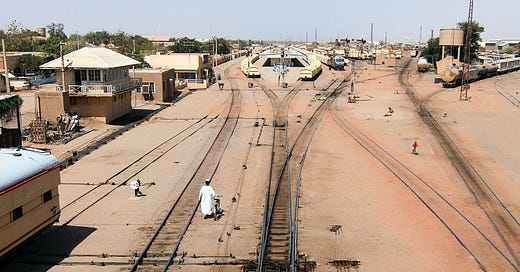THE TRAIN TO MARRAKESH
Departing from Algeciras on the train, we took the train-ferry to Ceuta, a Spanish colony on the Moroccan coast of Africa, where I would board another train to Marrakesh. It took just over an hour, past the Strait of Gibraltar and across the meeting of the Atlantic Ocean and the Mediterranean Sea.
BTW, the trains in Spain (nice rhyme) were, at the time, on a different gauge track than the trains of the rest of Europe, a holdover from war so that invaders could not easily enter their country.
Ceuta is steeped in history, archeological sites, architecture, and statues. Its population is less than 100,000, and is small in area, only a few miles across on a peninsula jutting into the sea.
When we arrived at the port, the end of the line for my train, hundreds of Moroccans poured off the train. They crowded the exits and climbed out the windows. It was a swarm of bodies. All were male, workers in Spain I was told, home for the weekend. They quickly made it through Customs, into Morocco, and on their way. We remaining Europeans, Australians, and a few Americans began lining up for our turn.
After a good while, we were moved to another line. And after waiting again, then back to the first line. It began to look like they were messing with us. Customs agents and soldiers with automatic rifles looked us over with sour, intimidating faces. What’s going on here we began asking each other?
This was not easy as we were of different languages. Of the countries I visited, I found Spain the most difficult for me in which to communicate. And all the more so here in Ceuta being a crossroad of cultures. Usually, I could always find someone who knew enough English to help me out.
I gathered that ongoing political tensions between Morocco and Spain over ownership of the city had flared up again. And also, that the King of Morocco had recently sent a large number of troops off to fight somewhere (I didn’t hear where) and they had incurred heavy losses.
With no explanation to us, it appeared that we would not gain entry into Morocco. Only one Swiss traveler made it through Customs. Slowly we dispersed back into the city. There would be no train to Marrakesh for me.
Though disappointed, I spent the rest of the day roaming the streets of the beautiful city. Ceuta stood out in contrast when compared to the town lining the border on the Moroccan side, where men and women in woolen shawls led donkeys up and down narrow hilly streets amid one-story adobe-like houses crowded next to each other. I saw no cars. It looked poor. Third worldish. Of another time.
I purchased souvenirs in the active marketplace, a couple of which I still have. Haggling the price was the thing. As neither party understood the other’s language or money values, it was interesting to say the least. The wily merchants with jewelry and leather goods, and children with trinkets on outstretched arms were relentless. They hawked their goods at every turn pursuing me through the market. I think I made some good buys. At least the price kept coming down. It was a lot of fun!
I thought about staying over but since the morning’s run-in with Customs, and subsequent no-go to Marrakesh, I had turned my thinking toward the cliffs and beaches of the Costa del Sol. I purchased a ticket for the evening ferry back to Algeciras.
A huge full moon rose over the Mediterranean in the twilight of a cool December evening as the ferry plied its way through a smooth and rolling glassy sea.
It was a full day on the one day I spent on the African continent.
———————-
*photo by Mohamed Zekry.





James Ron, so appreciate you sharing your tales and travels! Never been, but well told glimpse into that far away place.
Beautiful James! Thank you for pointing this out to me. What an adventure! You did not say when this trip took place, and I am curious. The atmosphere sounds very much like Algiers with the military presence. That was in 1992, armed soldiers on every corner. I was glad not to be alone on that week-long work assignment. You brought back memories! Thank you.